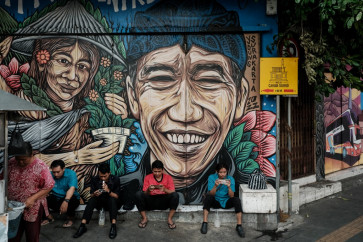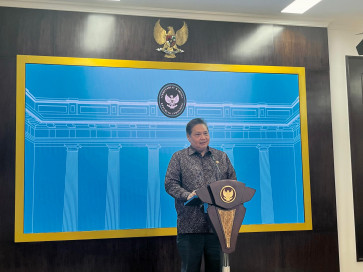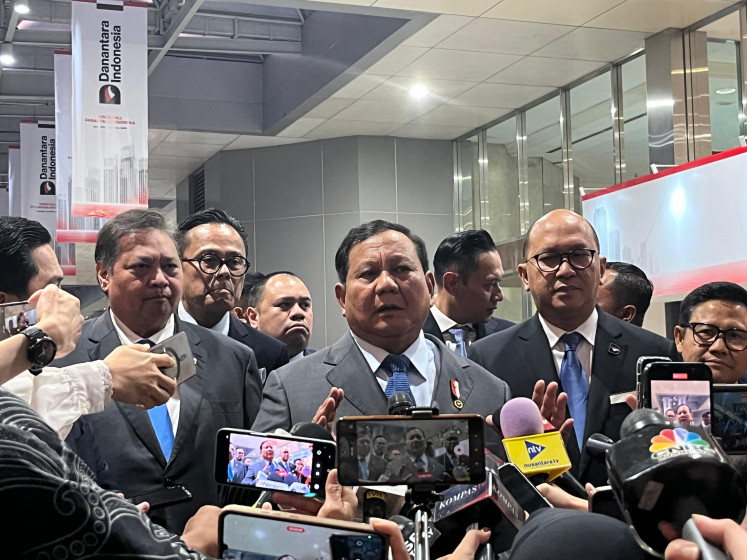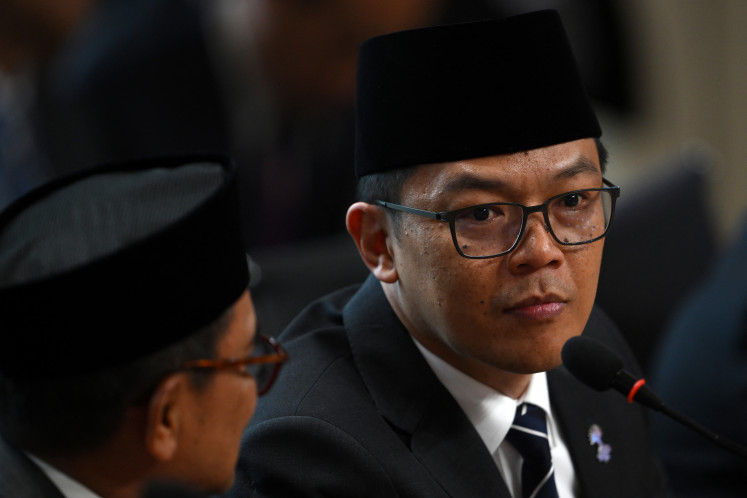Bank Indonesia's no-dollar rule may create distortion: Govt
A top minister has claimed that Bank Indonesia (BI) is open to the possibility of revising a ban on the use of US dollars for domestic transactions, which is slated for implementation starting on July 1, amid heightening worries among major importers and state-owned firms
Change text size
Gift Premium Articles
to Anyone

A
top minister has claimed that Bank Indonesia (BI) is open to the possibility of revising a ban on the use of US dollars for domestic transactions, which is slated for implementation starting on July 1, amid heightening worries among major importers and state-owned firms.
If the ban of dollar transactions is implemented as planned, it might create 'distortion' in the economy, Coordinating Economic Minister Sofyan Djalil said Friday after a meeting with top economic ministers and BI officials at the Vice Presidential Office in Jakarta.
However, the minister explained the government would fully respect the central bank's independence and jurisdiction, and the final say on the rule would be decided in an internal discussion of BI's board of governors.
'The conclusion here is that Bank Indonesia is fully aware about the issues that we raised during the meeting,' Sofyan said after a meeting that was attended by Vice President Jusuf Kalla, BI deputy governor Ronald Waas and Finance Minister Bambang Brodjonegoro, among other top economic policymakers.
'BI will soon hold an internal discussion so that the implementation of this rule would not cause a distortion [in the economy]. BI will discuss this issue internally,' he added.
In March, BI issued a central bank regulation that would forbid the usage of non-rupiah transactions or anything other than rupiah for local transactions beginning July 1, in a bid to rein in US dollar demand onshore and stabilize the rupiah, which is Asia's worst-performing currency and has depreciated by 7 percent this year.
In Indonesia, local businesses ranging from those selling apartments to electronic goods frequently quote their prices in US dollars to avoid unwanted price fluctuations due to the rupiah's depreciation.
In industry, many manufacturers still use dollars to purchase imported goods for their production inputs.
The non-rupiah transactions amount to US$12 billion daily, equivalent to at least 15 percent of private domestic demand, according to the central bank's estimates.
However, economic stakeholders have feared that the regulation, though it might boost local rupiah demand in the short term, could actually drive up costs and expose them to currency risks in the long run.
Irene Cheung, a senior foreign exchange strategist with ANZ Bank, noted that the rule might force companies to shift from borrowing funds in dollars, which have lower interest rates, to rupiah. This could eventually push up borrowing costs in the economy, she said in a research note released recently.
'We see a risk that this regulation could halt the inflow of dollars to the country,' commented Orias Petrus Moedak, the chief financial officer of PT Pelindo II, a state-owned company responsible for managing ports in South Sumatra, Jakarta and West Java.
The dollar ban, he argued in a phone interview, would discourage transactions in seaports as it could trigger discomfort among shippers, who poured in $700 million of foreign-exchange proceeds annually to the economy through four state-owned port operators, namely PT Pelindo I-IV.
Orias also noted that local companies were using dollars for a 'natural-hedging' mechanism to safeguard against the volatility of the rupiah, which has depreciated by 30 percent in the last two years.
Indonesian companies could pay between 7 and 11 percent for the hedging costs, which was very expensive by regional standards, he said. For comparison, data compiled by Bloomberg shows that the price of forwards used to hedge against exchange-rate losses in Malaysia and Philippines average at between 2.5 and 3.5 percent.
Internal discussions within the central bank over the implementation of the rupiah-only rule is still ongoing, according to BI spokesperson Peter Jacobs. However, Peter stated that the central bank had calculated the rule's economic implications carefully, as it already granted exemptions for economically important transactions such as those related to the state budget, infrastructure, international trade and international financing.
He claimed that not all parties opposed the foreign-exchange ban. Recently, the central bank gathered hundreds of executives from Japanese companies at BI's headquarters in Jakarta to explain about the rule and they all happily agreed to comply, he said.
'We are not issuing something unusual here, this is a common rule that has been done in other countries,' he stated. 'Please don't over-generalize: If one or two parties are unhappy with this regulation, then that doesn't mean that everyone in the economy is unhappy.'









